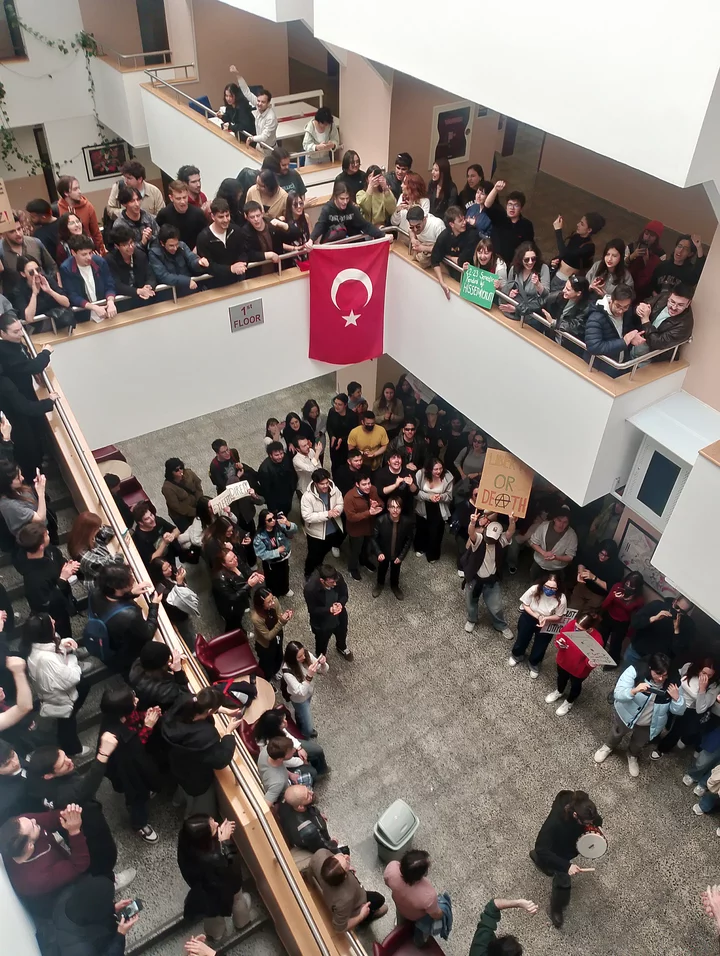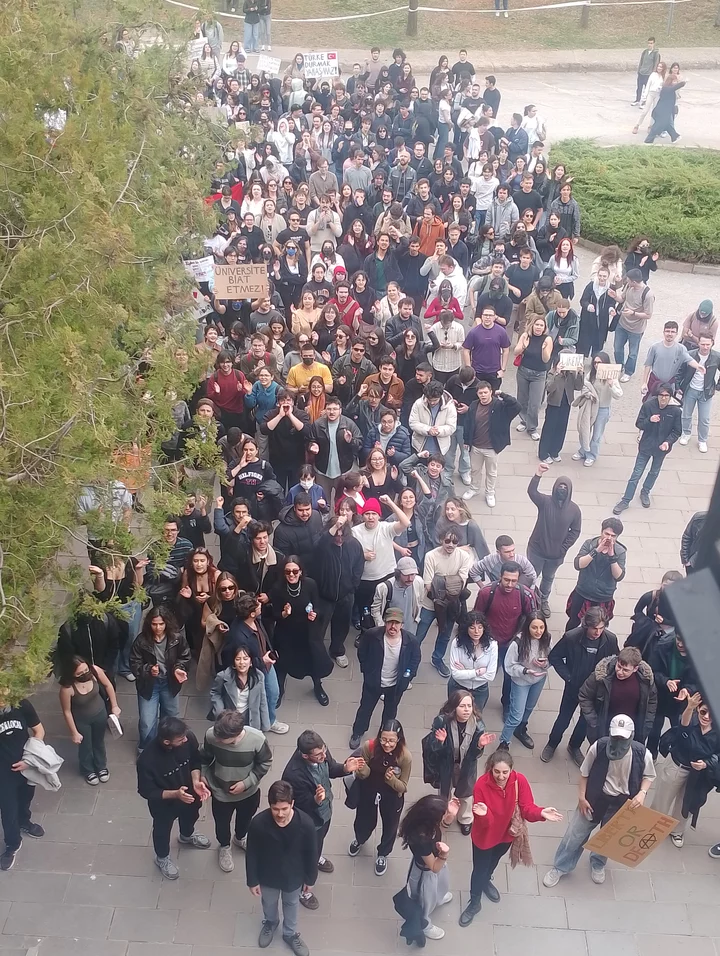The
sound was deafening – chanting, stomping feet, cheers and boos. The
din was coming from very nearby. Getting up from the desk where I’d
been lesson planning, I went to the window. Outside a large group of
students had gathered at the entrance to the building.
“Dersler yok!” Cancel classes! This was one of the rallying cries. The group about 150 or so students was led by a female student carrying a bullhorn. Others were demanding that security open the doors to the building, which had been locked beforehand as a precaution. Out in the corridor, a few students who had stayed for classes were standing at the windows, watching the demonstration and taking video on their smartphones. They grinned nervously, excitedly.
“I want to be active!” said one of them, a youth of perhaps eighteen, looking upon his peers with both admiration and envy.
Photos: Tressler.
The demonstrations have been happening here in Ankara and across the country for days, as the world by now surely knows. Since the arrest of popular Istanbul mayor and Turkish presidential candidate Ekrem Imamoglu last week, major anti-government protests have persisted in Istanbul, Izmir, and other cities. As you may have read, the mayor was accused of corruption and of links to the Kurdistan Worker’s Party, or PKK, which officially is listed here as a terrorist group. Here in the nation’s capital, similar unrest has continued both in the center district of Kızılay, where the government offices are located, but has also spread to university campuses. Which is what was happening outside my office window this past Tuesday.
Many students say that, as young Turks, they are worried about their country’s future and fed up with the ruling government, led by President Recep Tayyip Erdogan, who has been in charge of this country since 2003, before most of these students were even born. Critics accuse Erdogan and his ruling AKP Party of manipulating the justice system, of falsely arresting Imamoglu so that, if convicted, he could be eliminated as a viable presidential candidate and also help AK Party recapture political control of Istanbul, which has been led by the minority CHP for the past few years.
After watching them protest for a while, I went back to my office to continue preparing for lessons. But then a roaring sound seemed to buzz around my ears, as if I were wearing headphones. Suddenly I realized the buzz was not a buzz but a clamor, much louder now than before, and it was coming from inside the building. You could even feel reverberations in the walls. The protesters were inside.
Out in the corridor, the students had gathered on every floor, holding signs (One young woman held a sign that read in English, “I DON’T NEED SEX BECAUSE THE GOVERNMENT F***S ME EVERY DAY;” another read, “LIBERTY OR DEATH” with the ‘A’ made into an anarchy sign.
The chants continued, as many students from the nearby classrooms joined them. There were more calls to cancel classes, calls for the government to resign, shouts of support for the minority party and so on, continuing for several minutes, with a few teachers, security staff and even janitorial personnel, their morning cleaning interrupted, quietly observing. Presently, the demonstrators filed out, exiting the building and taking their gathering over to a large green mall outside.
Inside, the school was unusually quiet. It was expected to be a quiet week anyway, with the end of the holy month approaching and the coming of bayram and the spring weather. The demonstration seemed in line with how the past few days have felt – a whole country once again rocked by tumult and unrest.
I say “once again” because for anyone who’s lived in Turkiye any length of time grows accustomed to its volatility, natural or not. In the fifteen years or so I spent in Istanbul, one had the opportunity to witness the riots and protests over Gezi Park back in 2013 – the proposed destruction of a park in Taksim Square that quickly became a rallying point for anti-government protests. Many of us call recall every evening in Istanbul and in cities across the country the strangely musical clamor of pots and pans, an evening ritual in which people stood on their balconies and banged these kitchenware as a show of unity against the government.
Then, there was the failed military coup of July 2016, when a calm Friday evening was suddenly overrun with tanks and soldiers on the bridges, jets soaring overhead in the night, and frantic citizens (my wife and I included) scampering to buy supplies from the shops that were still open, fearing days or even weeks of crackdowns and deprivations.
And of course, there were other upheavals: March 2020, when classes and everything else suddenly were brought to a screeching halt with the pandemic and the announcement of lockdowns, and we all had to more or less spend the next year of our lives at home. We’d scarcely gotten used to being back outside when in February 2023, a massive earthquake struck, killing more than 50,000 and displacing thousands more.
Throughout these events, the economy has been an ongoing soap opera, with hyperinflation and with each cataclysmic event plunging the lira further down against the dollar (after the recent arrest of the Istanbul mayor, the lira briefly fell to 40-1, before rebounding to about 35 – people say that the government sold a lot of dollars to help stabilize the currency.
I could go on, but at this point, what’s the point? Things are too touch and go. Millions rallied to support Imamoglu this past Sunday by voting for him as a presidential candidate. Meanwhile, protests continue each day, as evidenced by the demonstration right here in the building where I work this past week.
After Tuesday’s protest, some students returned to their classes. A few of them, looking sweaty, tired but nonetheless proud (empowered?), stood and talked excitedly to each other in the corridors and outside in the smoking area. From previous conversations, I’ve gathered that many of them wish to leave Turkiye upon graduation. They want to go West, to Europe, North America. Most of them seek money, as young people tend to do, but also because they want greater stability. Of course, looking at the region – from Ukraine to Gaza, and also at the growing tensions around the world, particularly between America and Europe, one at times feels troubled by the notion that perhaps nowadays nowhere is entirely secure, that greener pastures may be illusory.
But I was touched by the students’ passion, courage and commitment. As a journalist, I have witnessed many demonstrations over the years. The causes may differ – from environmental protests in Northern California, to anti-nuke rallies in Prague, and so on — but the feeling is the same, the desire to seize the reins, to somehow make some kind of change. To see citizens, here or elsewhere, young or old, have that look in their eyes, and to hear it in their voices, is something that never ceases to amaze, even inspire.
Will any of it make a difference?
“No,” says one young man, when asked. His eyes fall briefly, crestfallen. Then again, how often do such demonstrations prove to be effective anywhere? But maybe that’s not the lasting thing. For these young people, so often accused of being lazy and self-obsessed with social media, maybe it’s a relief to know that maybe after all they do care about their country’s future, and about their own. Perhaps it is the dawn of something.
(Note: The Istanbul mayor remains in custody. Later in the week, the terrorism charge was dropped, which means Imamoglu’s interim replacement can be from his party, rather than a hand-picked AK Party member, which would have occurred had the terrorism charges remained. Many here attribute this as a sign that the nationwide protests appear to have had some impact.)
###
James Tressler, a former Lost Coast resident and journalist, is a writer and teacher living in Ankara.


CLICK TO MANAGE